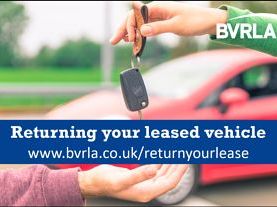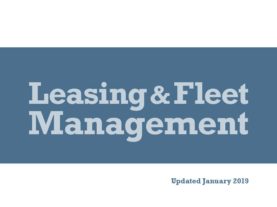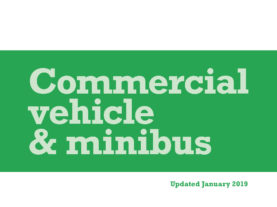Rental vehicles provide individuals and businesses with a safe, flexible, cost-effective and hassle-free transport solution. With more people opting for vehicle 'usership' over 'ownership', it is no surprise that there are over 11m car rental transactions and 5m van rental transactions every year in the UK.
1. Use a BVRLA member
If you can see the BVRLA logo when booking a vehicle, it’s a sign that you’re dealing with a company which adheres to high standards and a professional Code of Conduct. You can find your nearest BVRLA rental member by using the association’s Rental Directory.
2. Check what is and isn't included before you book
Pay close attention to what is and isn’t included in the reservation quote, especially when using price comparison websites. Many companies only provide a basic drive-away quote that may not include additional extras, such as child seats, sat-navs, paperwork for taking the vehicle abroad or additional drivers.
It is important to remember that you are liable for any loss and the full cost of any damage to the rental vehicle until it has been returned. Collision Damage Waivers and Theft Waivers cover the rental vehicle in the event of damage or theft and reduce the extent of your liability to the excess amount shown on your rental agreement.
All rentals booked through European websites will include Collision Damage Waiver, Theft Protection, tax and surcharges, however, this may not be the case if rentals are booked through American websites.
3. Tell the rental company how you plan to use the vehicle
Make sure that you tell the rental company if you plan to take the vehicle abroad. Some companies won’t let you take rental vehicles into certain countries. If taking a rental vehicle abroad you will need to request a VE103 vehicle on hire certificate from your rental company.
If you’re taking the vehicle abroad, most rental companies will charge you a fee for doing so, this will appear on the rental agreement. Ensure this fee is present on the rental agreement. Failure to inform the rental company that you are taking the vehicle abroad can result in additional costs as per the rental company’s terms and conditions.
4. Read the paperwork before you sign the contract
A rental agreement is a legally binding contract and the utmost care and attention should be given when reading the terms and conditions within. Make time to read and understand the Ts&Cs. A copy should be available on the rental company's website or you can ask for a copy of the agreement prior to your rental, so that you can read it in your own time.
5. Check if you’re covered in the event of an accident
It’s important to know the difference between the excess waivers offered by rental companies and the policies sold by third-party excess-reimbursement insurers. They are not the same product.
You should be aware that the excess reimbursement policy provided by a third party has no connection to your rental company and it does not eliminate your agreed excess. You therefore reman liable for this amount, which is usually held as a deposit on your credit card. In the event of damage or theft of the vehicle you must pay the excess to the rental company and make a claim on the excess reimbursement policy.
It is also worth checking if there are any exclusions in your loss or damage waiver, such as roof, windscreen or tyre damage.
6. Be aware of the local road laws and regulations
You’ll be liable to pay a fine, penalty or parking charge notice and administrative fee if you’re caught committing a road traffic offence, parking illegally or failing to pay a toll charge. If going abroad it is worthwhile familiarising yourself with the driving regulations of the country you’re visiting.
7. Understand the fuelling options you have
Your rental rate will not include the cost of fuel. Most companies will give you the option of buying a tank of fuel from them and returning the car empty or with a full tank. Make sure you remember which option you agreed and avoid returning the vehicle with too much or too little fuel.
Ensure you note the cost-per-litre charges on your rental agreement for refuelling. This can be notably higher than the cost of fuel at the pump as numerous factors are considered, not just the fuel aspect. Therefore, it is better to ensure you know which fuel policy you are on to avoid any surprise charges.
8. Arrive prepared with the right documentation
Remember to arrive at the rental company with the correct documentation required for collection, such as the credit card used for booking and your driving licence. The credit card must be in the name of the main driver.
UK driving licence holders will also need to bring a DVLA check code to allow the rental company to see details of any endorsements you may have. If you forget to generate the code in advance, you may be able to do so using a mobile device at the rental desk but you will need your national insurance number.
Ensure you have considered any extras or upgrades you may wish to make and how much you are prepared to pay for them.
9. Take photos or videos of the vehicle before you drive away
Thoroughly inspect the vehicle inside and out before driving away and familiarise yourself with its controls. Make sure that every chip, dent and scratch is noted on the pre-inspection report. Anything missing should be added. Inspect the wheels, windscreen and lights, as these are common damage areas. Take photographs/videos of any damage on the vehicle before leaving the parking area.
10. Don’t drop and dash. Leave enough time to return the vehicle
Allow plenty of time to check over the vehicle’s condition with a rental agent present when returning the vehicle. When you drop the car off out of office hours, you are liable for any damage that occurs between you returning it and the company inspecting it.
11. Know where to go if you have a complaint
In the unlikely event of a dispute that could not be resolved directly with the rental company, you can escalate a complaint to the BVRLA’s Alternative Dispute Resolution Service if you rented a vehicle from a BVRLA member in the UK. This service is free of charge. If you have a complaint for a rental that took place in Europe, the European Car Rental Conciliation Service may be able to help.




